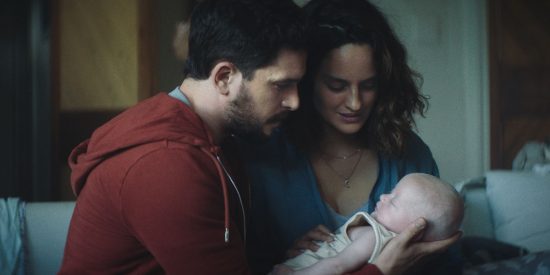TIFF 2022 Review: Baby Ruby – “There are powerful themes explored”

Courtesy of TIFF
“Nothing’s going to be any different. It’s just a baby,” says Josephine (Noémie Merlant, Portrait of a Lady on Fire) at her picture-perfect baby shower. And it has to be perfect. As a successful lifestyle blogger and influencer, Jo prides herself on appearance. When she rotates the cake on her table of impeccable pastries a half an inch, we learn that she likes having control of that appearance too. Motherhood though, as much as Jo might like to think otherwise, is less about control and more about controlled chaos.
At the hospital, Jo has nightmares (or are they flashbacks?) about giving birth. She cries in the bathroom, the first crack in her facade. Yet, when she leaves the hospital with baby Ruby things again are again picture perfect. They take a photo outside the doors, and as her husband Spencer (Kit Harington) proudly carries the car seat, the new family looks rested, happy, confident.
Jo begins to feel like everything is working against her, even her baby, her husband and her mother-in-law (Jayne Atkinson) and the lines of reality come blurred for the new mother. What becomes increasingly clear to her is that things are not what they seem, and Jo must take drastic action to save herself and baby Ruby from the horrors and danger that surrounds them.
Director Bess Wohl, whose background stems mainly from theatre, crafts a psychological thriller that intensely looks at aspects of motherhood that often go undiscussed. It contrasts nicely with the perfection we, as a society, express via social media where we can post only the happiest of moments and add filters to hide even the tiniest cracks in our veneers. New motherhood is not always perfect and rosy, and yet women are expected to adore and relish this new, permanent role. “I feel like I’m disappearing,” says Jo, as motherhood is leaving little room for anything else from her old life.
Baby Ruby tells a story that requires a female voice to tell it, and Wohl coupled by an emotional and strong performance from Noémie Merlant are just the combination. This importance of perspective was never more evident than in the screening I attended where a man next to me audibly laughed in a scene where Merlant, breast pump attached, is inspecting the changes to her body post-birth, dismayed by her appearance. I don’t have children, but most women can relate to these moments, likely never more intense than after you’ve given birth. It’s treated with sensitivity and understanding by Wohl and Merlant and so important to have this lens with which to depict this female experience and transformation.
There are powerful themes explored in Baby Ruby. Yes, this is postpartum depression taken to the highest level – full of hallucinations and conspiracy – but this very real mental distress, no matter how mild or severe, is still something that is not often discussed. Wohl uses some horror techniques here, from the sound design amplifying every baby cry until it gets under your skin, to some jump scares and inferences of the unthinkable. It does get a little repetitive by the end, but it’s a film that while celebrating the power and love of a mother, also understands that deep down the transition to motherhood is so much more than the societal expectation and image portrayed. It is difficult, can be lonely, and lead to mental health concerns. We should be talking about that more.










